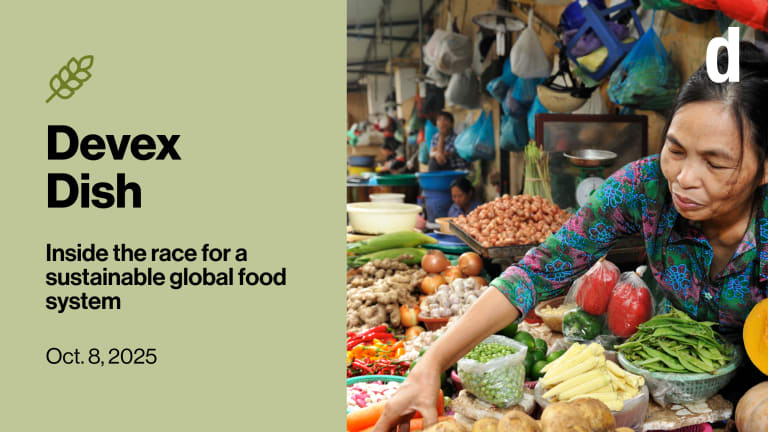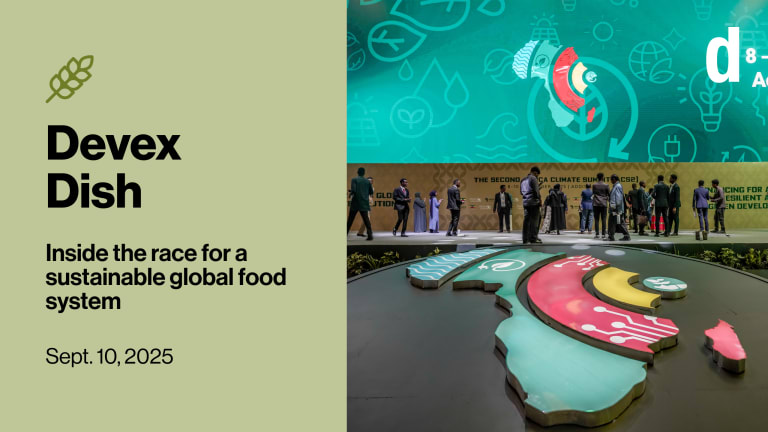
Here’s a stat that caught my eye: Rice production accounts for some 10% of global human-made methane emissions.
That figure is even higher in some countries in Southeast Asia, the world’s rice bowl. Those emissions are generated by the bacteria that form when water in flooded rice paddies prevents oxygen from reaching the soil.
This is a preview of Devex Dish
Sign up to this weekly newsletter to get the inside track on how agriculture, nutrition, sustainability, and more are intersecting to remake the global food system.
Rice is a staple grain for half of humanity. And since the 1960s, the Philippines-based International Rice Research Institute has been using science and breeding techniques to create varieties of rice that are healthier for both humans and the planet.
“Not only are we hoping that the agriculture that drives rice-based food systems has a lower impact on the environment, but that the quality of the produce coming out of those systems is healthier for the population,” IRRI Director-General Yvonne Pinto tells Devex contributor Rebecca Root.
IRRI has had some notable successes in the last few years. It deployed golden rice seeds, a genetically engineered variation that contains a plant pigment that the body converts into vitamin A, a lack of which can lead to blindness. (The rollout, however, met some opposition from critics of genetically modified crops.) More recently, IRRI’s researchers have bred a variety with a lower glycemic index and higher protein that could help address the rising incidence of diabetes and improve people’s protein intake.
Pinto, who took helm of IRRI in May, points to the importance of food science — a field that aims to transform food systems by combining chemistry, biochemistry, nutrition, microbiology, and engineering. It’s not yet fully understood as a key component to tackling human and environmental health, Pinto says.
At IRRI, Pinto oversees a staff of more than 1,000 as they reimagine rice production for a warming world. Don’t miss her interview with Rebecca on how that research is panning out — and why food science diplomacy is a key part of the puzzle.
Read: How food science is building more climate-friendly rice
See also: Heat waves underscore urgency of developing heat-tolerant crops
On the menu in New York
As the United Nations General Assembly barrels toward us — the high-level week is less than two weeks away! — I wanted to make sure you knew about some food systems events we are hosting as part of The future can’t wait: Shaping tomorrow, today, our Devex @ UNGA 79 event. They all take place Wednesday, Sept. 25.
• Food as a weapon in the new age of starvation, featuring Leslie Archambeault, managing director of humanitarian policy at Save the Children USA; Jeremy Konyndyk, president of Refugees International; Alex de Waal, executive director of the World Peace Foundation; and Abdulwasea Mohammed, advocacy, campaigns and media manager at Oxfam.
• Reimagining resilience: New ways of working in an age of compounding crises, in partnership with Food for the Hungry, featuring Alexia Latortue, assistant secretary for international trade and development at the U.S. Department of Treasury; and Food for the Hungry’s vice president of external engagement, Jonathan Papoulidis.
• Feeding the Future: Innovations and strategies for global food security, featuring Dr. Cary Fowler, the U.S. State Department’s special envoy for global food security; and Afshan Khan, assistant secretary-general of the United Nations and coordinator of the Scaling Up Nutrition Movement.
You can request to attend in person or join us online. For latest coverage of UNGA itself, be sure you’re subscribed to Newswire, our flagship daily newsletter.
📧 Hey Dish readers, I want to hear from you! What discussions and outcomes will you be looking out for at UNGA in regard to food system transformation, agriculture, malnutrition, and more? Let me know by emailing dish@devex.com, and your response might be featured in next week’s edition.
A stark report
Speaking of starvation … the United Nations special rapporteur on the right to food has accused Israel of a “starvation campaign” against Palestinians during the conflict in Gaza.
In a detailed 24-page report circulated this week, Michael Fakhri finds that Israel began starving Gazans on Oct. 9, 2023 — two days after Hamas’ surprise attack on Israel that killed more than 1,000 people. “By December, Palestinians in Gaza made up 80 per cent of the people in the world experiencing famine or catastrophic hunger,” he writes. “Never in post-war history had a population been made to go hungry so quickly and so completely as was the case for the 2.3 million Palestinians living in Gaza.”
Fakhri describes how Israel has “failed to enable and ensure” the unhindered provision of essential aid into the territory and has destroyed Gaza’s food systems by destroying and poisoning agricultural land, and decimating ports and fishing vessels — which has also been documented by other U.N. and rights groups. Fakhri also says that Israel’s tactics go back 76 years to Israel’s founding, decades during which, he says, Israel has deployed “the full range of techniques of hunger and starvation throughout its entire history, perfecting the degree of control, suffering and death that it can cause through food systems.”
Meanwhile, Israeli Prime Minister Benjamin Netanyahu has called accusations that Israel blocks humanitarian aid from Gaza “outrageously false.”
“A deliberate starvation policy? You can say anything — it doesn’t make it true,” he said in a press conference last week. Fakhri is due to speak to the U.N. about the report on Oct. 18.
Background: Why famine is ‘inevitable’ in Gaza — and what’s next
See also: How international norms against weaponizing starvation eroded
Follow the money
There was one word on many people’s lips at last week’s Africa Food Systems Forum: Malabo.
Bringing home the bacon
Your next job?
Extended Term Consultant (Senior Agricultural Economist)
World Bank Group
Republic of Congo
The capital of Equatorial Guinea is where African Union leaders signed a declaration in 2014 to end hunger on the continent by 2025 by improving economic growth through agriculture-led development. As the Malabo Declaration approaches its end, attendees at last week’s forum were coming to terms with its shortcomings — and discussing what policies need to be changed ahead of the declaration’s next iteration, the Kampala Declaration, a draft of which is due out in January.
For example, African governments spend just 4.6% of public budgets on agriculture, falling short of the 10% target set by the Malabo Declaration, reports Devex contributor David Njagi, who attended last week’s food systems forum in Kigali, Rwanda.
“We are evaluating what has been implemented in terms of investment, private sector participation, and public sector resources allocation,” Ibrahim Mayaki, the AU’s special envoy on food systems, told David. The Kampala Declaration will aim to create 20 million jobs per year over the next 20 years, Mayaki added.
Many at the forum also acknowledged the need for much more political will if the continent is to overcome its hunger crisis. “African food systems have not received the political attention they deserve. If you ask me how we came to this conclusion, I would say just look at the amount of investments we put into our food systems,” said former Ethiopian Prime Minister Hailemariam Desalegn during a panel discussion.
That puts a pin in our coverage of the forum for now. (Oh, and ICYMI — AGRA President Agnes Kalibata was spotted rocking some very cool sneakers!)
Read: 4 takeaways from the Africa Food Systems Forum
Background: African groups want ‘reparations’ for Green Revolution’s shortcomings
+ One of the plans by African leaders to improve agricultural productivity is to triple fertilizer use on the continent. But a fertilizer fund housed at the African Development Bank needs $2 billion. Devex Pro members can read all about its fundraising challenges.
+ Not yet a Devex Pro member? Sign up today for a 15-day free trial to access all our exclusive reporting and analyses, data-driven funding insights, career resources, and more.
Chew on this
African civil society organizations are concerned about being excluded from the upcoming Kampala Declaration on agriculture in Africa. [Business Daily Africa]
Smoke from cooking causes an estimated 4 million premature deaths per year. [The Economist]
An estimated 3.2 million children are now suffering from acute malnutrition in Afghanistan. [BBC]
Search for articles
Most Read
- 1
- 2
- 3
- 4
- 5








